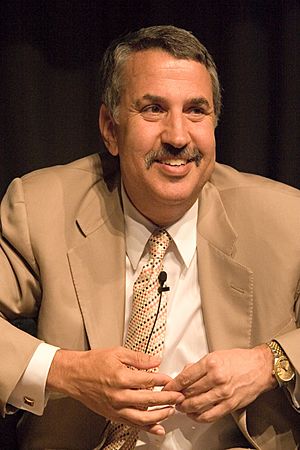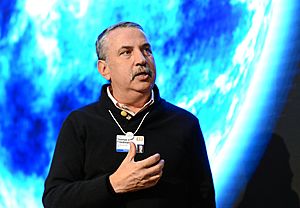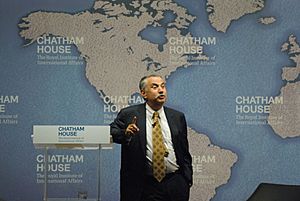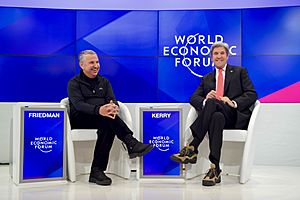Thomas Friedman facts for kids
Quick facts for kids
Thomas Friedman
|
|
|---|---|

Friedman in 2005
|
|
| Born |
Thomas Loren Friedman
July 20, 1953 |
| Education | Brandeis University (BA) St Antony's College, Oxford (MPhil) |
| Occupation | Author Columnist |
| Spouse(s) | Ann Bucksbaum |
| Children | 2 |
| Relatives | Matthew Bucksbaum (father-in-law) |
Thomas Loren Friedman (born July 20, 1953) is an American political commentator and author. He is famous for writing weekly articles for The New York Times. He has won the Pulitzer Prize three times.
Friedman writes a lot about foreign affairs (how countries interact), global trade (buying and selling between countries), the Middle East, globalization (how the world is becoming more connected), and environmental issues. He started as a reporter and won his first two Pulitzer Prizes in the 1980s. These were for his reporting on conflicts in Lebanon and politics in Israel. He won another prize in 2002 for his comments on the war on terror.
Contents
Early Life and Education

Thomas Friedman was born on July 20, 1953, in Minneapolis, Minnesota. His parents were Margaret and Harold Friedman. His father, Harold, worked for a company that made ball bearings. He passed away when Tom was nineteen. His mother, Margaret, was a homemaker and a part-time bookkeeper. She also served in the United States Navy during World War II.
When he was young, Friedman dreamed of becoming a professional golfer. He loved playing sports, especially tennis and golf. He even worked as a caddy at a local golf club. In 1970, he caddied for professional golfer Chi-Chi Rodríguez during the US Open tournament.
Friedman is Jewish. He went to Hebrew school and then St. Louis Park High School. There, he wrote for his school newspaper. He became very interested in Israel after visiting in 1968. He spent three summers living on a Kibbutz (a community farm) called HaHotrim.
He first studied at the University of Minnesota. Later, he moved to Brandeis University and graduated in 1975. He then went to St Antony's College, Oxford at the University of Oxford as a Marshall Scholar. He earned a degree in Middle Eastern studies.
Journalism Career
After finishing his studies, Friedman joined the London office of United Press International. A year later, he moved to Beirut, Lebanon, in 1979. He lived there for two years, covering the Lebanon Civil War.
In 1981, The New York Times hired him as a reporter. They sent him back to Beirut when the Israeli invasion of Lebanon began. His reporting on this war, especially the Sabra and Shatila massacre, earned him his first Pulitzer Prize for International Reporting. He also won the George Polk Award for his foreign reporting.
In 1984, Friedman became the New York Times Jerusalem Bureau Chief. He stayed there until 1988. That year, he won his second Pulitzer Prize for his reporting on the First Intifada (a Palestinian uprising). He wrote a book about his experiences in the Middle East called From Beirut to Jerusalem. This book won the National Book Award for Nonfiction in 1989.
Friedman later covered Secretary of State James Baker and then became the White House correspondent for the New York Times in 1992. In 1994, he started writing more about foreign policy and economics. The next year, he became a foreign affairs columnist for the New York Times. In 2002, he won his third Pulitzer Prize for his clear writing about the global impact of terrorism.
In 2002, Friedman met Saudi Crown Prince Abdullah. He encouraged the Prince to try and end the Arab–Israeli conflict. This led to the Arab Peace Initiative, which Friedman has strongly supported.
Friedman also received the 2004 Overseas Press Club Award for his long career. He was also honored by Queen Elizabeth II with the Order of the British Empire.
His Views and Ideas
Friedman has written a lot about important global issues.
Globalization
Friedman first shared his ideas on globalization in his book The Lexus and the Olive Tree (1999). Globalization means how countries and people around the world are becoming more connected.
Later, after visiting places like Bangalore, India, and Dalian, China, he wrote another book called The World Is Flat (2005). In this book, he suggests that technology and communication have made the world "flat," meaning everyone can compete and connect more easily.
Friedman believes that countries sometimes need to give up some control over their economy to global groups. He calls this the "golden straitjacket." He has also talked about the United States needing to be more independent from foreign oil.
He also thinks that American immigration laws are too strict. He believes that letting more talented people into the U.S. would help the economy.
Terrorism
After the September 11 attacks in 2001, Friedman focused more on the threat of terrorism. His articles on this topic won him the 2002 Pulitzer Prize. These articles were later put into a book called Longitudes and Attitudes.
He has called for governments to pay attention to "hate speech" that encourages violence. He believes that people who make excuses for terrorism should also be called out.
Environment
Friedman has written about the environment and energy. In his book Hot, Flat, and Crowded, he talks about the need for a "Green Revolution." This means finding new ways to get energy and protect the planet.
He believes that the demand for clean energy will grow a lot. He wants America to be a leader in this area. He suggests that car companies should make more hybrid-electric cars that can run on different kinds of fuel.
Israel
Friedman has written many articles about Israel. He has sometimes been criticized for his views on the conflict between Israelis and Palestinians. He has also commented on the relationship between the U.S. and Israel.
He supported the peace agreement between Israel and the United Arab Emirates in 2020. More recently, he has written about political changes in Israel and the 2023 Israel–Hamas war. He has urged Israel to avoid actions that could make the region unstable.
China
Friedman has also written a lot about China. In 2009, he wrote about China's one-party government. He noted how quickly China was growing in areas like electric cars and solar power.
His book The World is Flat was very popular in China. A translated version of his article "China Needs Its Own Dream" helped make the phrase "Chinese Dream" famous in China. This term was later used by Chinese leader Xi Jinping.
Friedman believes that a strong America and a strong China are both important for the world. He has also said that former President Trump was tough on China, which he saw as necessary.
Radical Centrism
In the 2010s, Friedman wrote about "radical centrism." This idea suggests finding common ground and solutions that are not too far left or too far right in politics. He believes that people who want to find middle-ground solutions need to organize and make their voices heard.
Personal Life
Friedman's wife, Ann, is a teacher. She is the daughter of a real estate developer named Matthew Bucksbaum. Thomas and Ann were married in London in 1978. They live in Bethesda, Maryland and have two daughters, Orly and Natalie.
Friedman has supported different political candidates in U.S. elections. He supported Hillary Clinton in 2016 and Joe Biden in 2020. He is also on the board of directors for Planet Word, a museum about language in Washington, D.C.
Awards
Friedman has won three Pulitzer Prizes, which are very important awards for journalists:
- 1983: For his reporting on the war in Lebanon.
- 1988: For his reporting on Israel.
- 2002: For his comments on the global impact of the terrorist threat.
Published Works
- From Beirut to Jerusalem (1989)
- The Lexus and the Olive Tree: Understanding Globalization (1999)
- Longitudes and Attitudes: Exploring the World After September 11 (2002)
- The World Is Flat: A Brief History of the Twenty-first Century (2005)
- Hot, Flat, and Crowded: Why We Need a Green Revolution—And How It Can Renew America (2008)
- That Used to Be Us: How America Fell Behind in the World It Invented and How We Can Come Back (2011) – Co-written with Michael Mandelbaum
- Thank You for Being Late: Finding a Job, Running a Country, and Keeping Your Head in an Age of Accelerations (2016)
See also
 In Spanish: Thomas Friedman para niños
In Spanish: Thomas Friedman para niños
- Curiosity quotient
- New Yorkers in journalism
 | Percy Lavon Julian |
 | Katherine Johnson |
 | George Washington Carver |
 | Annie Easley |



